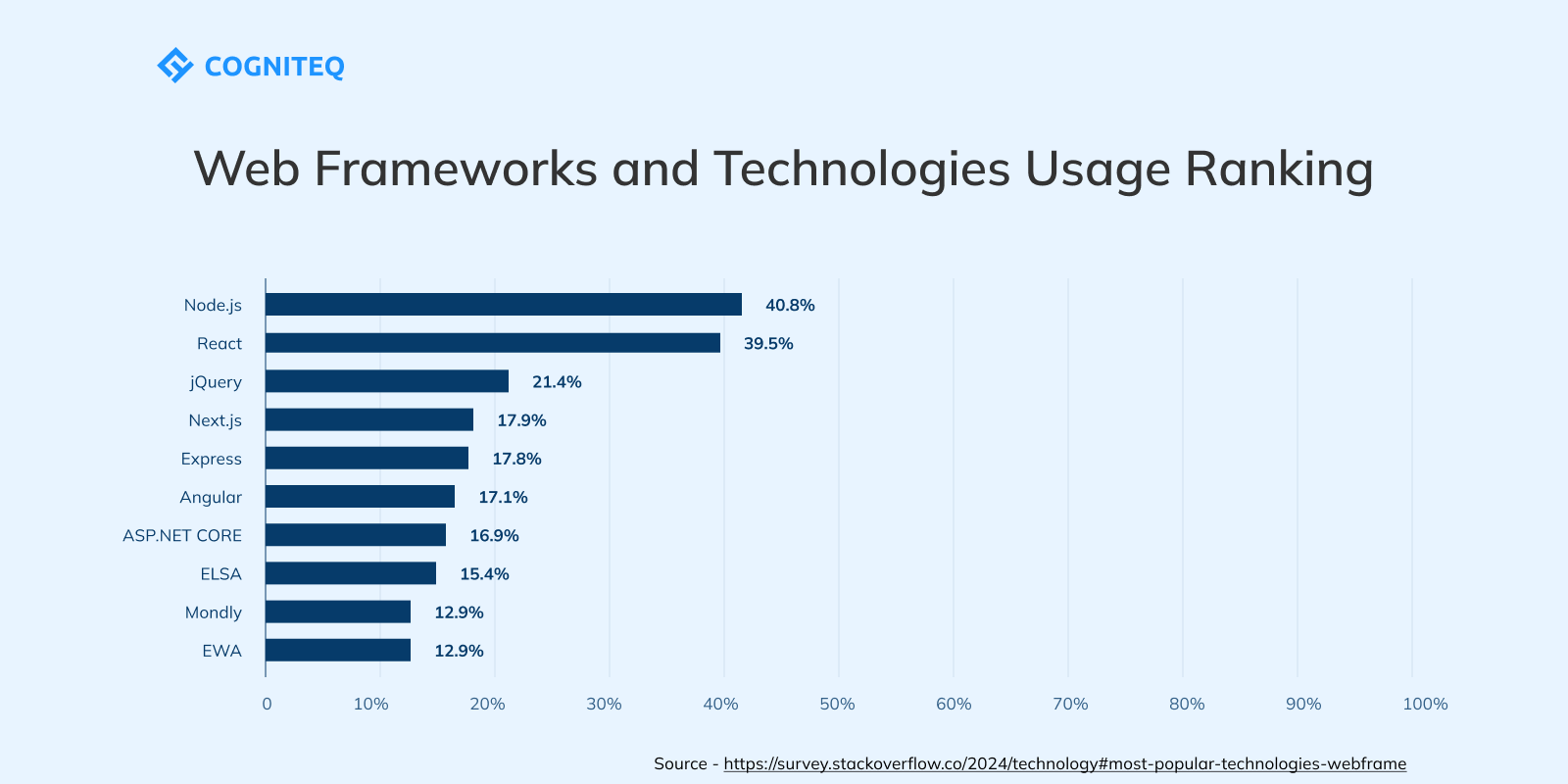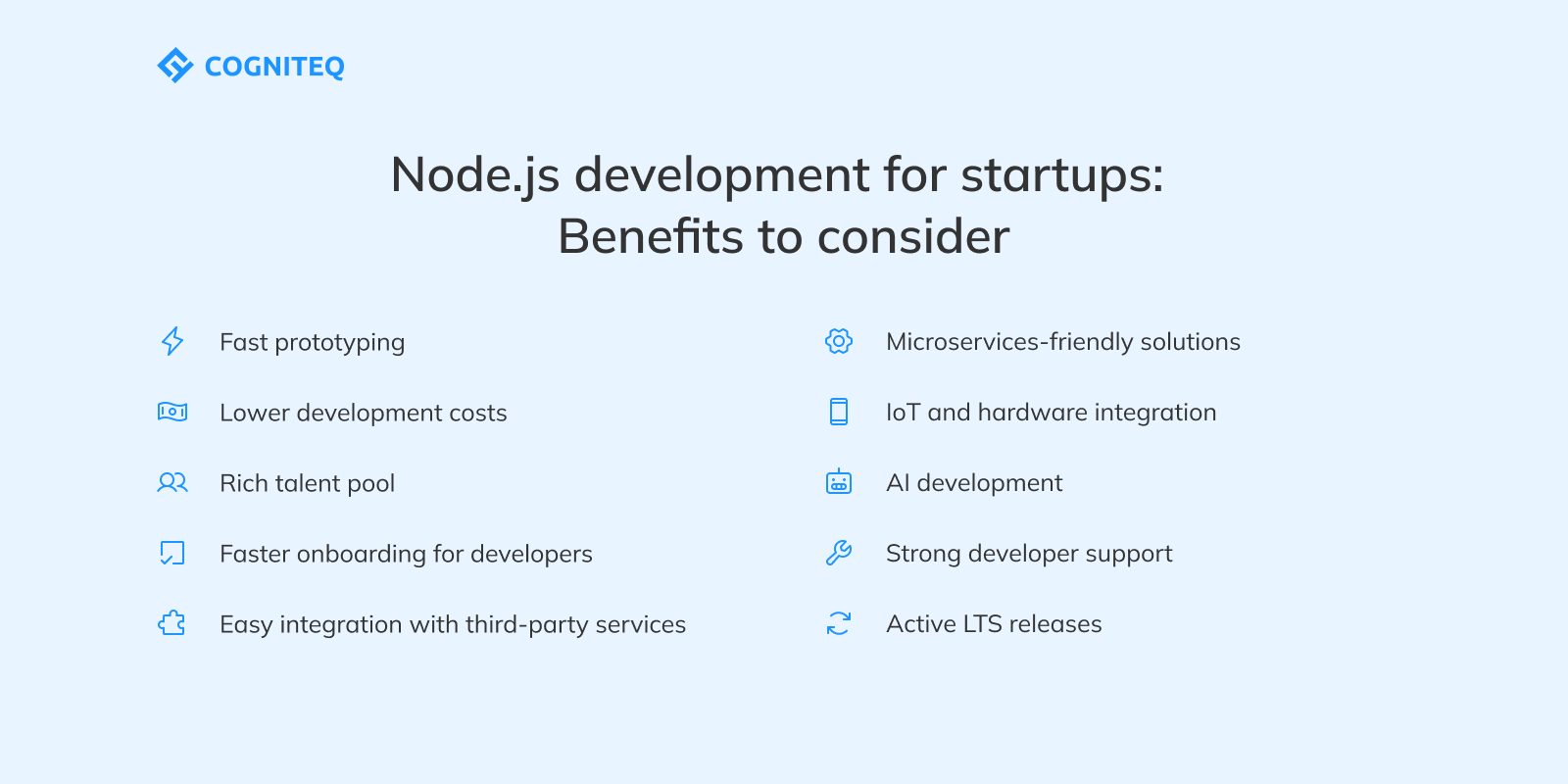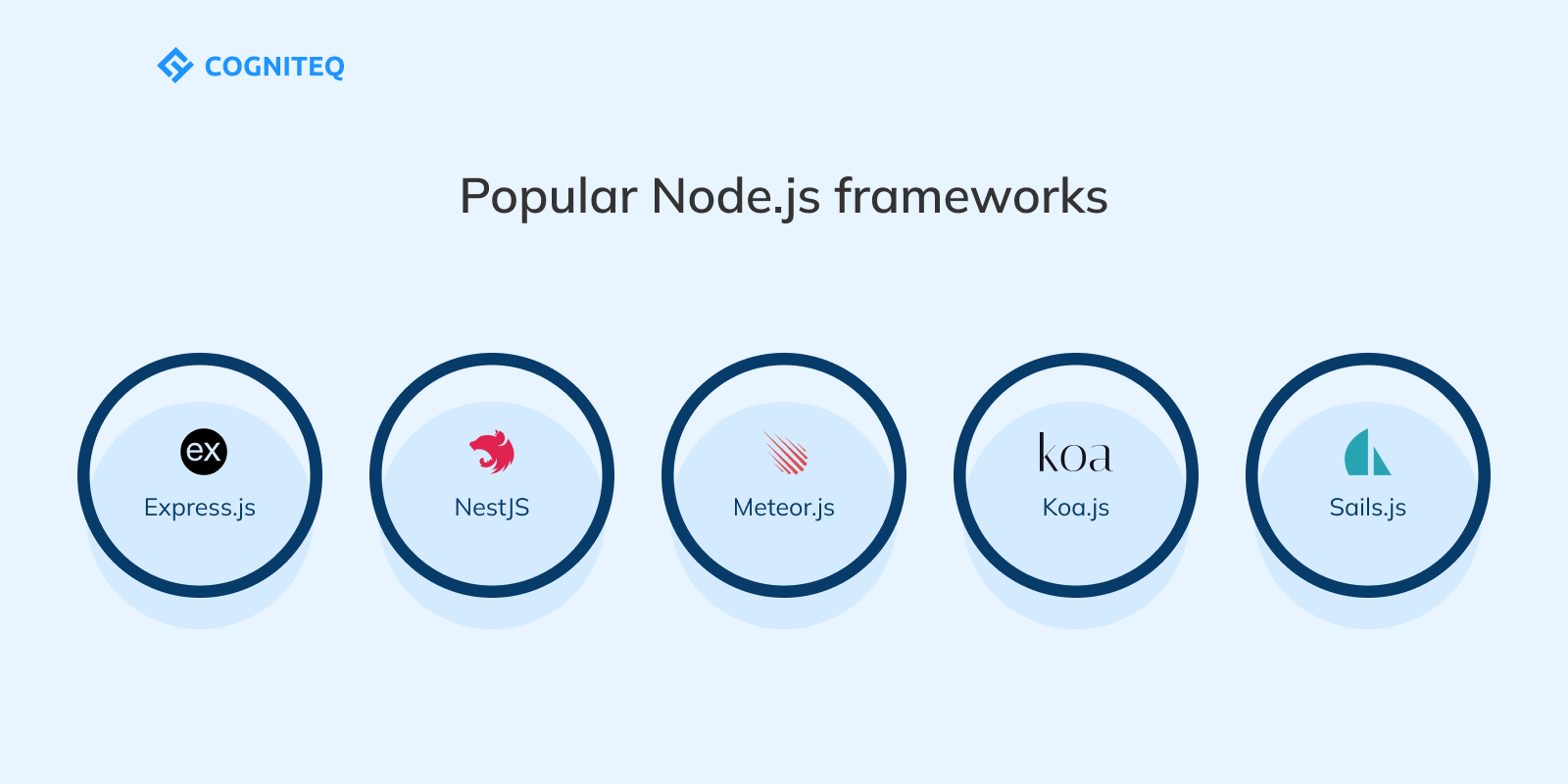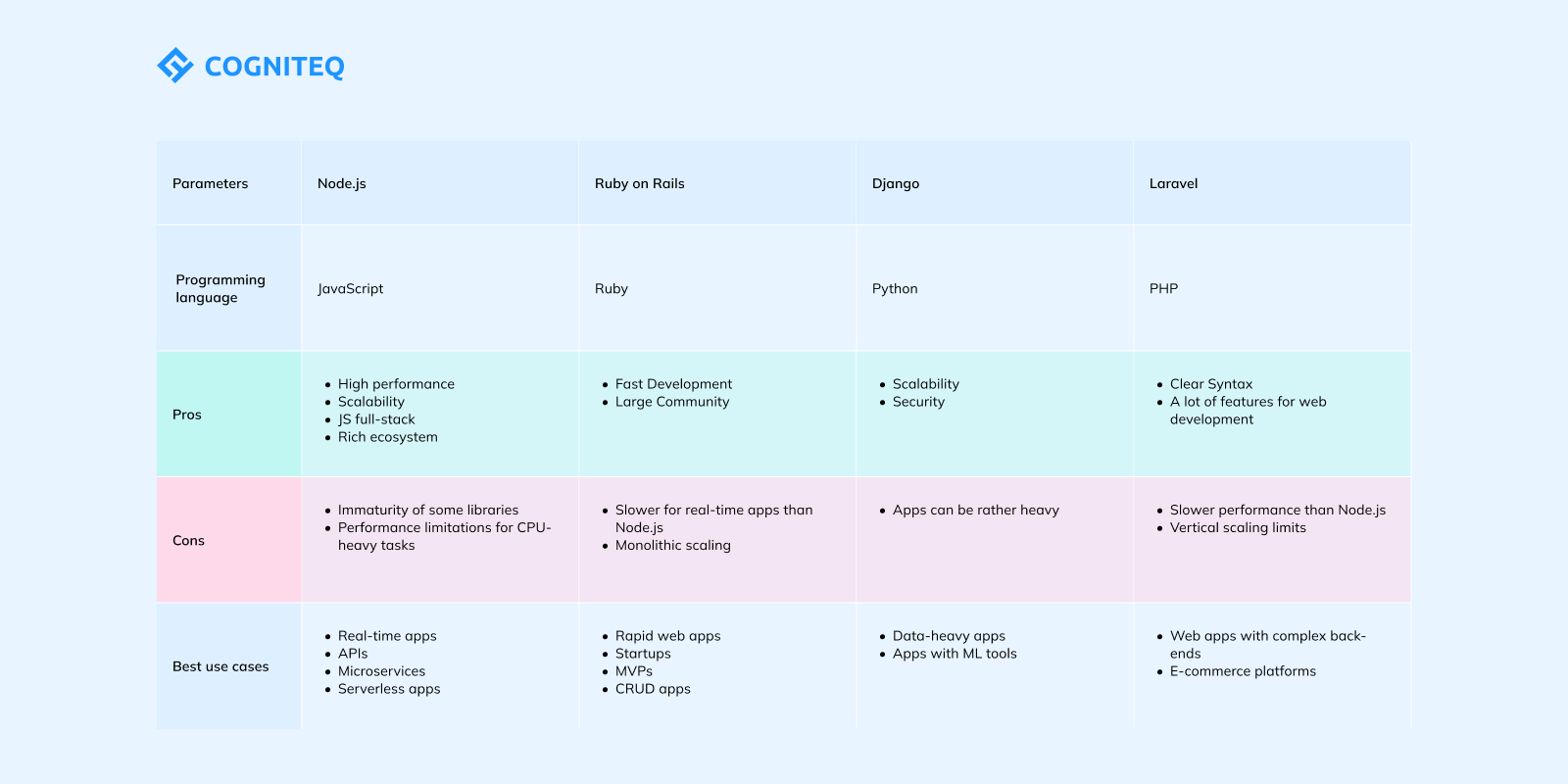Quite often, startups have limited resources and tight deadlines to implement their projects. They need to move fast and scale efficiently. And the chosen technologies for building their solutions should meet these requirements. Node.js is among the options that align with this critical need for speed and flexibility. It allows young companies to validate ideas quickly and grow without serious technological barriers.
In this article, we are going to talk about the benefits of Node.js web development and explain why it can be a good choice for your startup.
What is Node.js?
Node.js is an open-source, cross-platform runtime environment that lets developers run JavaScript code on the server side. Traditionally, JavaScript was used only in browsers for client-side interactions. With Node.js, it is possible to apply JavaScript for both front-end and back-end.
Node.js is built on Google’s V8 JavaScript engine. What sets Node.js apart is its event-driven, non-blocking I/O model. Instead of handling one request at a time in a blocking manner, Node.js processes multiple requests simultaneously via an event loop.
According to the 2024 Stack Overflow Developer Survey, it is the most used web technology among professional developers and those who are starting their professional paths.

Node.js web development: Key features
We have been working in the software development industry for more than 15 years. Over this period, we had the opportunity to observe the rise and fall of different trends. In recent times, we can see the growing demand for Node.js web application development services. This is explained by the peculiarities and features of this technology, which help enhance both the web development process and performance of future solutions. Let’s consider the most significant of them.
- Asynchronous and event-driven architecture. It means that the performance of separate tasks, like reading files or querying databases, doesn’t hold up the rest of an app. This enables a server to handle multiple requests simultaneously.
- Fast performance. Node.js compiles JavaScript into machine code. This makes execution extremely fast. It has a lightweight model that boosts performance, which is especially valuable for real-time applications.
- Scalability. Node.js runs on a single thread. But despite this fact, its event loop can manage thousands of concurrent connections without performance deterioration.
- Full-stack JavaScript development. When you choose Node.js for your project, you can use JavaScript for front-end and back-end development. This approach enables code reuse and accelerates project delivery.
- Rich package ecosystem. Node Package Manager (npm) offers access to a huge library of open-source modules. As a result, developers can easily add the required functionality and manage dependencies.
- Cross-platform compatibility. Node.js runs smoothly on all major platforms, such as Windows, macOS, and Linux. This ensures great flexibility in deployment and development environments.
Node.js development for startups: Benefits to consider
Nowadays, Node.js boasts high popularity among companies that are just beginning their business journeys and are looking for cost-effective approaches to web development. Here is why.

- Fast prototyping. For startups, the possibility to test their ideas quickly and without serious investments is a must. Node.js enables rapid prototyping with minimal setup and lets teams iterate on MVPs faster than many other technologies.
- Lower development costs. Financial concerns are pressing for many young businesses. Node.js provides vast possibilities to optimize costs. For example, by using JavaScript as a programming language for full-stack development, startups can avoid hiring two separate front-end and back-end teams. Moreover, by integrating open-source modules with the required functionality, developers don’t need to write every code line on their own. This can greatly streamline the app creation process.
- Rich talent pool. Node.js has a large developer community worldwide. Startups benefit from easier recruitment and lower salary competition compared to niche technologies. Apart from this, if a startup plans to cooperate with an outsourcing Node.js web development company, it will not be very complicated to find a team with relevant expertise.
- Faster onboarding for developers. Thanks to the popularity of JavaScript and Node.js, it is pretty easy to onboard developers familiar with such technologies. This reduces training costs and delays.
- Easy integration with third-party services. Node.js allows developers to connect their apps to APIs, cloud services, and other tools quite smoothly. As a result, startups can build feature-rich products quickly without the necessity to create everything from scratch.
- Microservices-friendly solutions. Node.js works well in microservices setups. When applying this architecture, startups can break their apps into smaller, manageable services. Thanks to this, they can easily scale their products and update features without disrupting the entire system.
- IoT and hardware integration. Node.js helps speed up IoT development and enables real-time communication between devices and servers. By using this runtime, startups can avoid the extra complications of the IoT development process. In one of our blog posts, we explained the key steps for integrating IoT devices with Node.js.
- AI development. Currently, a lot of startups experiment with AI. Node.js apps can be easily integrated with various AI APIs. As a result, such applications can be equipped with features like live recommendations, streaming data analysis, or interactive chatbots.
- Strong developer support. Startups can leverage existing open-source modules, frameworks, and plugins. This reduces development risk and speeds up problem-solving.
- Active LTS releases. Node.js offers stable LTS (long-term support) versions. It means that startups get reliable updates, security patches, and support in the long term.
Looking for a team to build a web app for you using Node.js?
At Cogniteq, we have seasoned developers with solid expertise in Node.js and related technologies. Let’s discuss what we can do for you.
Popular Node.js frameworks: Quick overview
The use of Node.js frameworks can help streamline development and enforce app structure as they offer built-in tools for common tasks. It’s time to explore some of the most popular frameworks that we often apply when we provide Node.js web development services.

Express.js
It is a minimalist framework that is flexible and easy to learn. It is often used for building REST APIs and microservices. However, when developers work with it, they need to implement architecture decisions themselves.
NestJS
This full-featured framework with modular architecture can be chosen for increasing enterprise applications, scalable APIs, and microservices. It was built with TypeScript, which can be a reason for a steeper learning curve.
Meteor.js
This framework provides real-time data updates out of the box. Thanks to this, many real-time apps, collaborative tools, and chat apps are built with its help. Nevertheless, this framework can be rather heavy for small applications.
Koa.js
Koa.js is a lightweight framework that can be chosen for APIs and microservices.
However, it’s important to bear in mind that the generators used by Koa are not compatible with any other type of Node.js middleware.
Sails.js
This MVC framework can be utilized to build enterprise apps and data-driven APIs. It easily integrates with databases, but can be rather complicated for small projects.
Node.js and its alternatives: Brief comparison
Web development using Node.js can be a sensible choice for many scenarios. However, there are cases when it is not a suitable option due to various reasons. Given this, we offer you to consider some of the popular frameworks that can be viewed as Node.js alternatives.

Factors that influence the cost of Node.js web development services
The cost of Node.js web development services always remains one of the most important considerations for businesses. The overall development expenses depend on a range of factors.
- Project complexity. An MVP with basic features will cost significantly less than a large-scale platform with advanced functionalities.
- Team composition and hiring approach. The rates of developers vary by their expertise and region. Moreover, labor costs will differ for in-house specialists and external teams. For startups, it is often much more feasible to work with a tech partner, like Cogniteq, than to expand their staff.
- Integration with external services. The more integrations your app requires, the higher the recurring costs can be. It is explained by the fact that the use of APIs, cloud storage, authentication tools, and other services is often related to expenses on subscription or transaction fees.
- Security and compliance. The implementation of strong security measures, like encryption or multi-factor authentication, may add to costs. Nevertheless, thanks to strong protection, you can avoid greater financial risks later.
Node.js web development: Best practices
Based on our experience in Node.js web development, we have prepared the following practical tips.
- Always organize code into clear folders. This will help you keep projects maintainable as they grow.
- Implement centralized error handling and add logging to track issues before they can affect users.
- Secure your web app in a proper way. Sanitize user inputs to prevent injection attacks and store sensitive data not in code, but in environment variables.
- Stream large files instead of loading them entirely into memory.
- Conduct unit and integration tests as early as possible. This will ensure reliability as the project scales.
- Implement logging and use monitoring tools to track performance, memory usage, and errors in production.
Node.js web development services by Cogniteq
At Cogniteq, we have solid Node.js expertise. That’s why our clients often choose us as a Node.js web development company for their projects. One of the projects that we worked on was the creation of a web-based online course platform and related iOS and Android apps.

We had a task to build a solution that would be used by institutions, businesses, and individual educators to organize corporate training, virtual lessons, etc. One of the key peculiarities of this platform was live video streaming functionality.
To ensure great scalability and stability of performance of this real-time app, our team chose Node.js. It allowed us not only to cope with the main tasks but also to optimize the development time and costs.
The app was positively welcomed by its target audience, and some of the world-famous universities are considering this solution as a platform for their online courses.
Final word
Node.js offers startups a good combination of fast prototyping and development, scalability, and cost-efficiency. Given this, it is one of the most practical technologies for modern web development. It has a rich library ecosystem, which allows teams to choose from ready-to-use modules instead of building every single feature from scratch.
However, to fully leverage all the advantages of Node.js web development, you need to have professional developers with relevant expertise by your side.
If you are looking for such a team, we, at Cogniteq, are always ready to support you. We can join your project at any stage and help you successfully achieve your business goals with a scalable and reliable web solution. Contact us to learn more about our experience and Node.js web development services.
FAQ
What is Node.js web development?
Node.js web development projects presuppose building web solutions with the help of Node.js, a JavaScript runtime environment. This technology allows developers to use JavaScript on both the front-end and back-end. This approach to building web apps enables faster development cycles and seamless data handling.
Is Node.js a suitable technology for full-stack web development?
Yes, Node.js is a good option for such projects. It works well in full-stack setups, especially when it is used together with front-end frameworks like React or Angular. In such projects, teams can use JavaScript across the entire stack. This can help reduce complexity and improve productivity.
What companies rely on Node.js in web development?
Today, a lot of prominent companies, like Netflix, LinkedIn, PayPal, Uber, eBay, Citibank, and Walmart, use Node.js in their web products. This technology ensures scalability, speed, and the possibility of running high-traffic, real-time applications.
Is Node.js a better option for web development than PHP?
It depends on the project. Node.js is better suited for real-time, event-driven applications and high concurrency, while PHP is still common for traditional CMS-based websites like WordPress. Startups often prefer Node.js for scalability and speed.
What are the benefits of Node.js web development?
The use of Node.js can ensure faster development, excellent performance, high scalability, and stability of app functioning even with a large number of users. Apart from this, developers can leverage a rich ecosystem and strong community support.
How much does it cost to build web software with Node.js?
The cost fully depends on many variables, including project complexity, features, integrations, and the location of the development team. The price for simple websites may start from $15,000. However, the development of large-scale, feature-rich applications can cost $50,000 or more.
Is Node.js a good choice for building REST APIs?
Yes. Node.js is one of the most popular technologies for REST API development. Developers can rely on frameworks like Express.js or NestJS, which facilitate and streamline the creation of scalable APIs.
Can Node.js be used for developing real-time applications like chat or streaming?
Yes, Node.js is well-suited for building real-time apps. It is explained by its event-driven architecture. A lot of popular messengers, live streaming services, and online gaming apps are often powered by Node.js with WebSockets.
Does the use of Node.js for web development have any disadvantages?
As well as any other technology, Node.js has some limitations. It’s single-threaded. It means that it can struggle with CPU-heavy tasks. Callbacks and asynchronous code can be complex without proper structuring. Moreover, due to the rapid ecosystem growth, sometimes new npm packages can be poorly maintained.
How can I choose the best Node.js web application development company for my project?
When you are considering different companies to work with, you should take into account not only a financial factor (which is also important for the smart budget allocation). Apart from it, you should look for experience in building Node.js projects and in delivering custom software products for your industry. For example, at Cogniteq, we have been working with web technologies for more than 15 years. The accumulated expertise allows us to build solutions of different types and complexity. Moreover, clients’ reviews and the company’s portfolio can tell you a lot about your potential tech partner.
Is Node.js more scalable than Ruby on Rails or Django?
All these technologies have their strengths and weaknesses. And all of them have some particular use cases where they demonstrate the highest efficiency. Nevertheless, when it comes to scalability, Node.js is a leader. It has an asynchronous, non-blocking I/O model. It makes it a good choice for real-time, event-driven applications, where scalability is the highest priority.
Does Node.js web development have a future?
Today, we can observe that the popularity of Node.js web development continues to grow. Node.js has strong community support, a rich package ecosystem, and a lot of major companies back it. It is widely applied in solutions powered by microservices, serverless computing, and real-time applications. Based on this, we can make a conclusion that it will stay relevant in the long term.










































